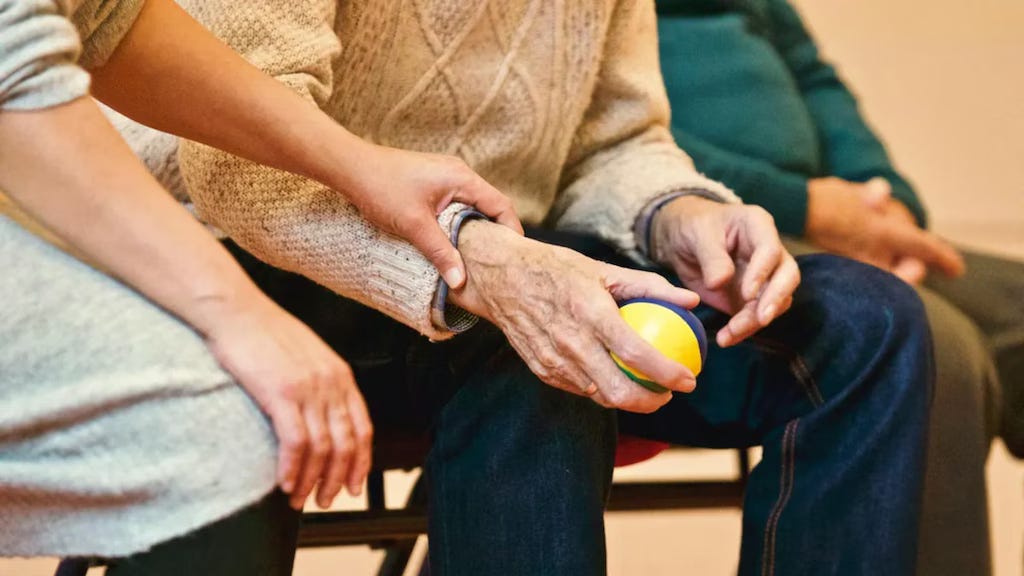Why It Is Time Kerala Addresses Its Elderly Situation
Analyzing the gaps in elderly care in Kerala and why these should be addressed in an urgent basis
A few years before his death, Anand’s grandfather was diagnosed with Parkinson’s disease, which slowly affected his memory, physical movement, and mental health. Although Kerala’s advanced healthcare system allowed for a timely diagnosis and access to necessary medication, managing his day-to-day needs was challenging. Trained home nurses were difficult to find and geriatric care facilities were not easily available.
There are many such cases all around us. While Kerala has achieved remarkable milestones in health indicators and quality of care, there seems to be a large gap in addressing the needs of its senior citizens. As Kerala’s elderly population continues to grow, the demand for geriatric care is growing. A lack of a well-structured policy creates challenges for patients and caregivers too. Anand’s family was left alone to figure out the needs of his grandfather’s care, which is a reality faced by many others in the state.
Kerala: The Grey State of India
Kerala, now called “The Grey State of India”, has the oldest population in the country. In the past 60 years, the elderly population in Kerala has shot up from 5.1 percent to 16.5 percent. Today the median age of Kerala is 35 years, while the rest of the country averages 28 years.
Kerala is known for having the best healthcare system in India. But Kerala also has the highest morbidity rates in India. The state is considered as the diabetes capital of India and has the highest prevalence of non-communicable diseases. These are diseases that disproportionately affect the old. Apart from physical ailments, the elderly also suffer from mental health issues due to stress, loneliness, and more.
Moreover, physical, psychological, emotional, sexual, and financial abuse of the elderly is an increasingly common phenomenon. While Kerala has the highest number of registered old-age homes in the country, there have been many reports of elderly abuse in such institutions.
The elderly care system in India is largely based on at-home care and support. With the emergence of nuclear families and increased migration, older people find themselves isolated. Many of the elderly are no longer employed or physically able to work leaving them financially insecure.
As more people are retiring from the workforce, the pressure on the working population to support this elderly population, either through direct care or through taxes, is increasing. Kerala's old-age dependency ratio, defined as the number of old people per 100 working population (15-59 years), is currently at 26.1%, against a national average of 15.7%. In another decade, this is estimated to increase to 34.3% (national average 20.1%).
This calls for a large-scale intervention in healthcare, age-friendly institutions and infrastructure, employability, and support mechanisms for the elderly.
Is The Government Doing Enough?
Recognising the increasing ageing population and the challenges that come along with it, the Kerala government was one of the first to introduce a policy for its elderly, the Old Age Policy 2006. This was later revised into the State Old Age Policy 2013. The policy serves as guidelines for introducing programmes to address the needs of the elderly.
The government also runs the Vayomithram project, which provides healthcare through mobile clinics. However, this has suffered from a lack of funds over the years and has not reached universal coverage. The Pakalaveedu programme and Sayamprahba project which started as mental health programmes also stuttered due to lack of funds and infrastructure. The Karunya At Home project, which delivers subsidized medicines to the doorsteps of senior citizens, is again not accessible by many. While Kerala has many welfare programmes for the elderly, it faces issues with last-mile connectivity and funds.
Kerala also has one of the strongest social security systems offering various pensions to senior citizens. Still, it has not improved the economic situation of the elderly, and most of the pensions they receive are spent on their monthly medication alone.
There is indeed a need for a comprehensive elderly policy in Kerala, and it will require engagements with community and private agencies.
Bottom-Up Solutions
Kerala’s palliative care model is community-driven and has been emulated worldwide. This system consists of thousands of volunteers to deliver palliative care to the doorsteps of patients as well as cater to their emotional and social needs. The state has over 1700 palliative care units providing home-based care most of which are run by NGOs and community-based organisations. A similar system in elderly care will be needed in the coming years.
There is also a need for more private investments, particularly in home care and building institutions for the elderly. The technology-based systems and home health model imparted by Medwell Ventures is one model that agencies in Kerala can replicate. They have professional home nurses who are provided with tablet PCs to share health parameters readily with doctors. The medical data is also stored in clouds and therefore improves on prescription of treatments and settlement of insurance claims.
Training youth to be caregivers and home nurses for the elderly should also be part of the policy. Though Kerala churns out quality nurses who get hired globally, the home nurses catering to the elderly within the state are often found to be untrained and sub-standard.
As the demand for old-age homes are increasing exponentially in Kerala, there is a need to develop partnerships with private agencies in developing such institutions. Public-private partnerships in elderly caregiving should be explored so that these services are accessible to everyone. Developing quality old-age homes will also remove the stigma surrounding such institutions.
Though Kerala’s healthcare model is good, there is a need for the state to develop a good public health model too. Public health is different from healthcare and is interdisciplinary. It deals with preventive measures while considering the health of the population as a whole. Public health steps like adult vaccination, lifestyle changes to prevent diseases like diabetes, and focus on mental health should be the prime focus of the government moving forward as these will impact an ageing population more.
The Need for a Comprehensive Elderly Policy
In the state budget for 2024-25, there was a slash of Rs 800 Cr in the allocation for public health. The state finances, at present, are not in a position to handle the increasing elderly population. This makes it even more urgent to frame a detailed policy which also ropes in private agencies as partners. The present pension scheme would also need re-visiting as the financial burden is increasing with time.
The policy should also tap into the potential contributions that senior citizens can make in various fields. Providing spaces and incentives for the elderly to continue working or engage in creative work like art, music, and literature can also have positive impacts on the existing ecosystem.
With every passing year, the situation will become even more complex. It is indeed time that Kerala urgently addresses this by framing a comprehensive, sustainable, and feasible policy.
Note for the readers:
If you liked this article, read our other articles by clicking here.









